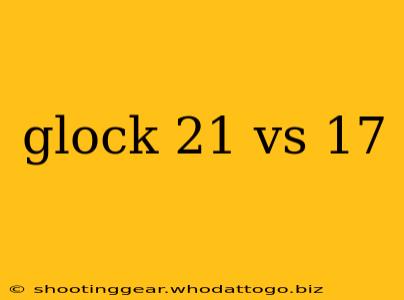Choosing between the Glock 17 and Glock 21 often comes down to personal preference and intended use. Both are highly reliable, popular handguns known for their durability and ease of use, but they cater to different needs. This in-depth comparison will help you decide which Glock is the right fit for you.
Caliber: The Defining Difference
The most significant difference between the Glock 17 and Glock 21 lies in their caliber. The Glock 17 is chambered in the ubiquitous 9x19mm Parabellum (9mm), while the Glock 21 fires the powerful .45 ACP. This fundamental distinction impacts everything from recoil and accuracy to stopping power and ammunition availability.
9mm (Glock 17): Advantages and Disadvantages
-
Advantages: Higher magazine capacity (typically 17 rounds), less recoil, more affordable ammunition, and generally easier to control during rapid fire. The lighter recoil allows for faster follow-up shots and improved accuracy for many shooters. 9mm is widely available, making finding ammunition less of a challenge.
-
Disadvantages: Generally considered to have less stopping power compared to .45 ACP. While advancements in 9mm ammunition have significantly bridged this gap, the .45 ACP still retains a larger wound cavity.
.45 ACP (Glock 21): Advantages and Disadvantages
-
Advantages: Considered by many to have superior stopping power due to its larger projectile and greater energy transfer. The substantial size and weight can help mitigate felt recoil for some shooters.
-
Disadvantages: Lower magazine capacity (typically 13 rounds), more significant recoil (which can impact accuracy and speed for some), higher ammunition cost, and potentially slower follow-up shots. .45 ACP ammunition can also be heavier to carry.
Size and Weight: A Matter of Comfort and Concealability
While both are classified as full-size handguns, the Glock 21 is noticeably larger and heavier than the Glock 17. This difference is crucial for both handling and carry.
-
Glock 17: More compact and easier to conceal, making it a suitable choice for concealed carry (though still challenging for some). It's generally more comfortable for smaller-framed individuals.
-
Glock 21: Its larger size makes it less ideal for concealed carry, better suited for open carry or home defense. The added weight can feel more substantial in the hand, but may be less comfortable for extended periods.
Ergonomics and Handling: Subjective Preferences
Both pistols boast Glock's renowned ergonomics. The grip angle is similar, promoting a natural point of aim. However, the larger size and weight of the Glock 21 significantly impacts its handling characteristics. Personal preference plays a significant role in determining which feels better in your hand.
Ammunition Availability and Cost: A Practical Consideration
The widespread availability and relatively lower cost of 9mm ammunition make the Glock 17 a more budget-friendly option. .45 ACP ammunition, while readily available, tends to be more expensive. This is a factor to consider, especially if you plan on engaging in extensive practice.
Conclusion: The Best Glock for You
Ultimately, the choice between the Glock 17 and Glock 21 hinges on your individual needs and preferences.
-
Choose the Glock 17 if: You prioritize high magazine capacity, lower recoil, affordability, and easier concealability.
-
Choose the Glock 21 if: You prioritize stopping power, are less concerned about concealability, and prefer the feel of a larger, heavier handgun.
Remember to handle both pistols before making a decision. The best way to determine which is right for you is to experience them firsthand at a gun range or gun store. Consider your intended use—self-defense, competition, or recreational shooting—to make an informed choice.

